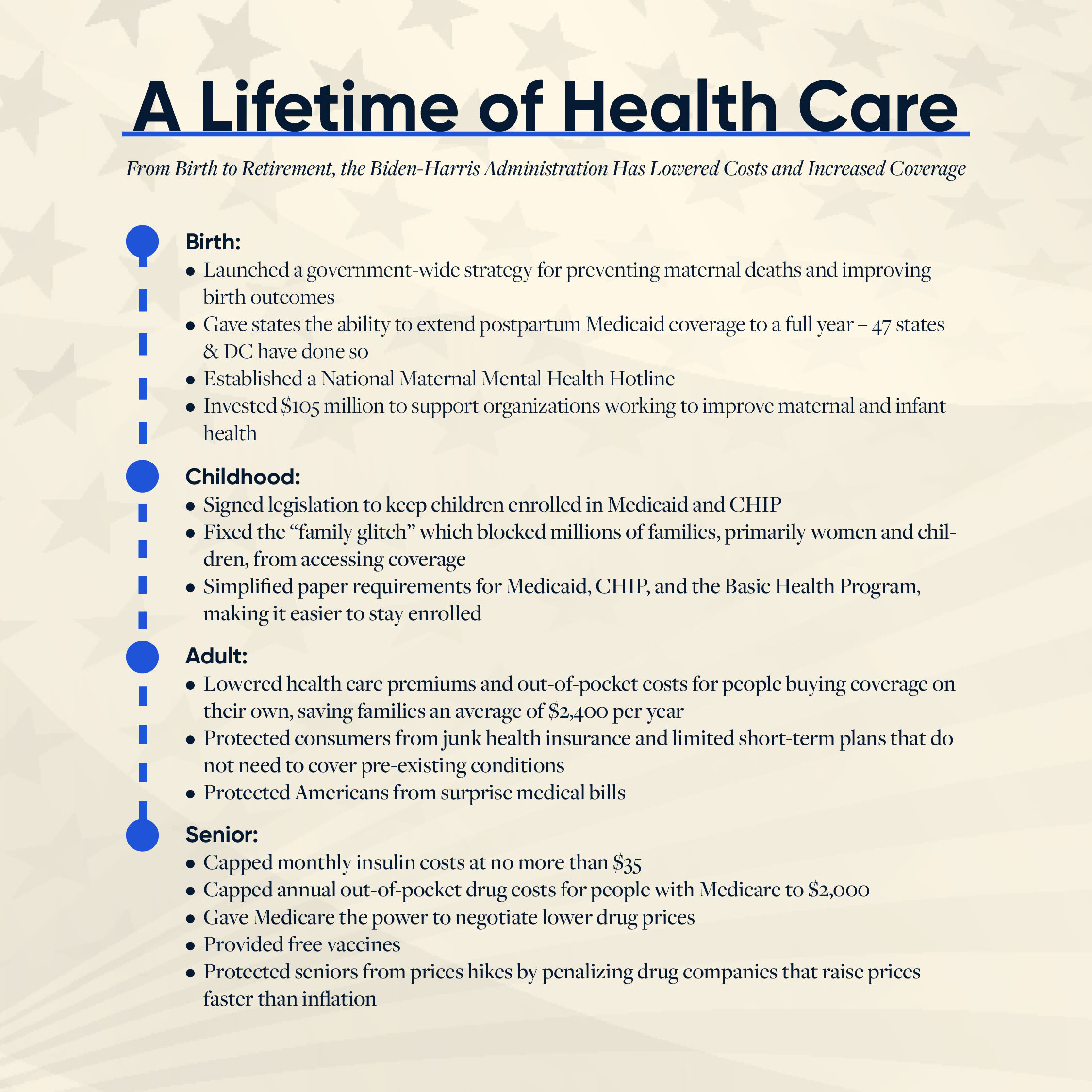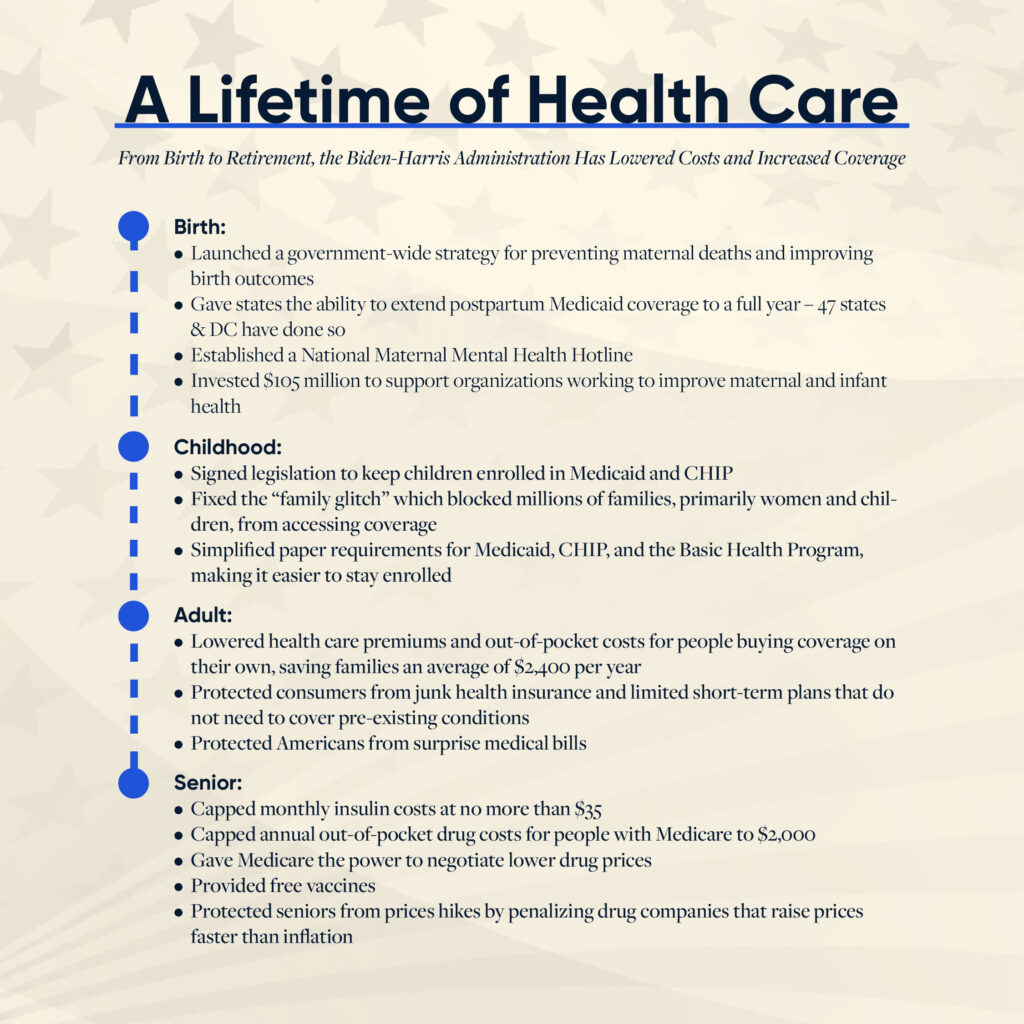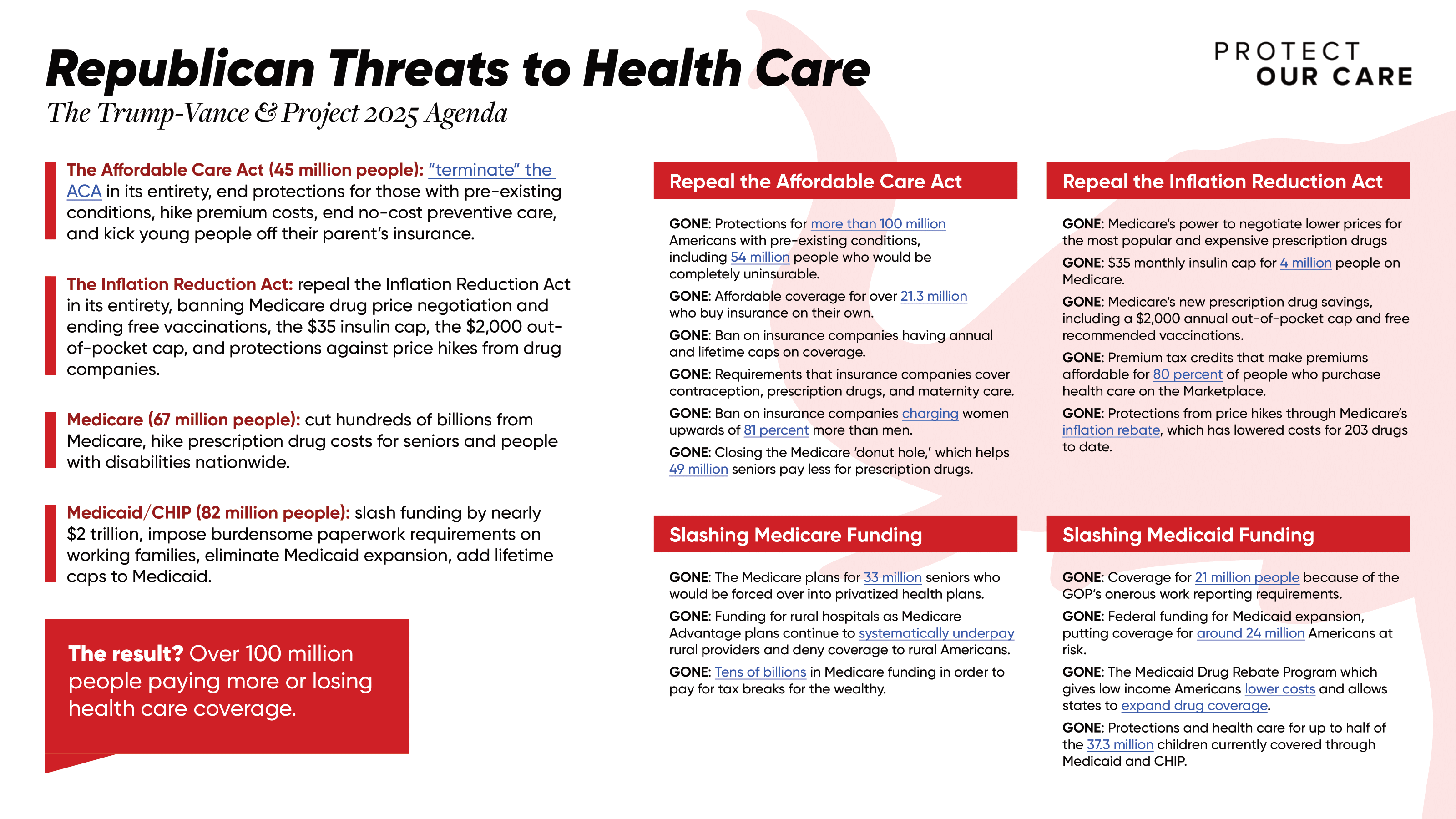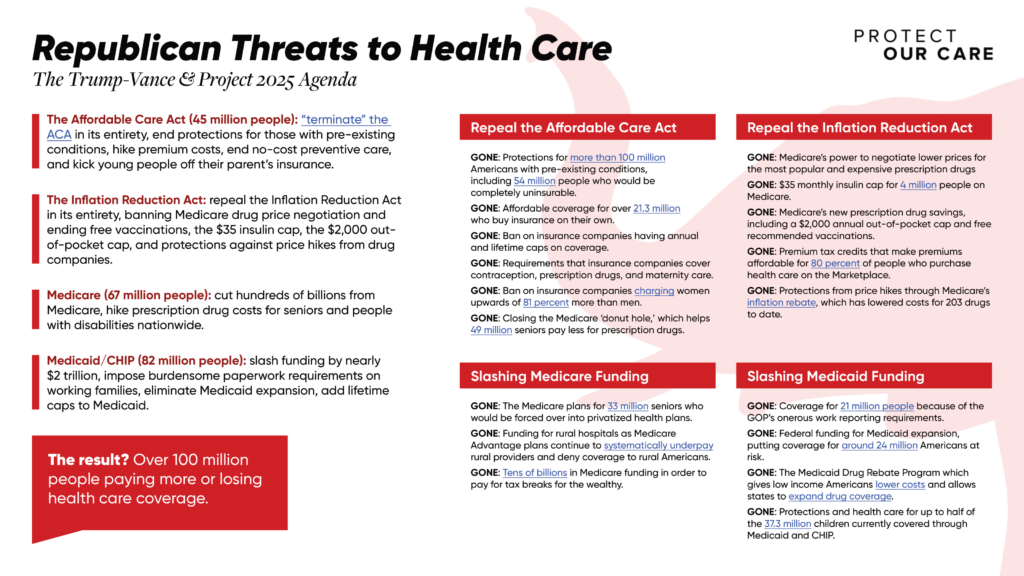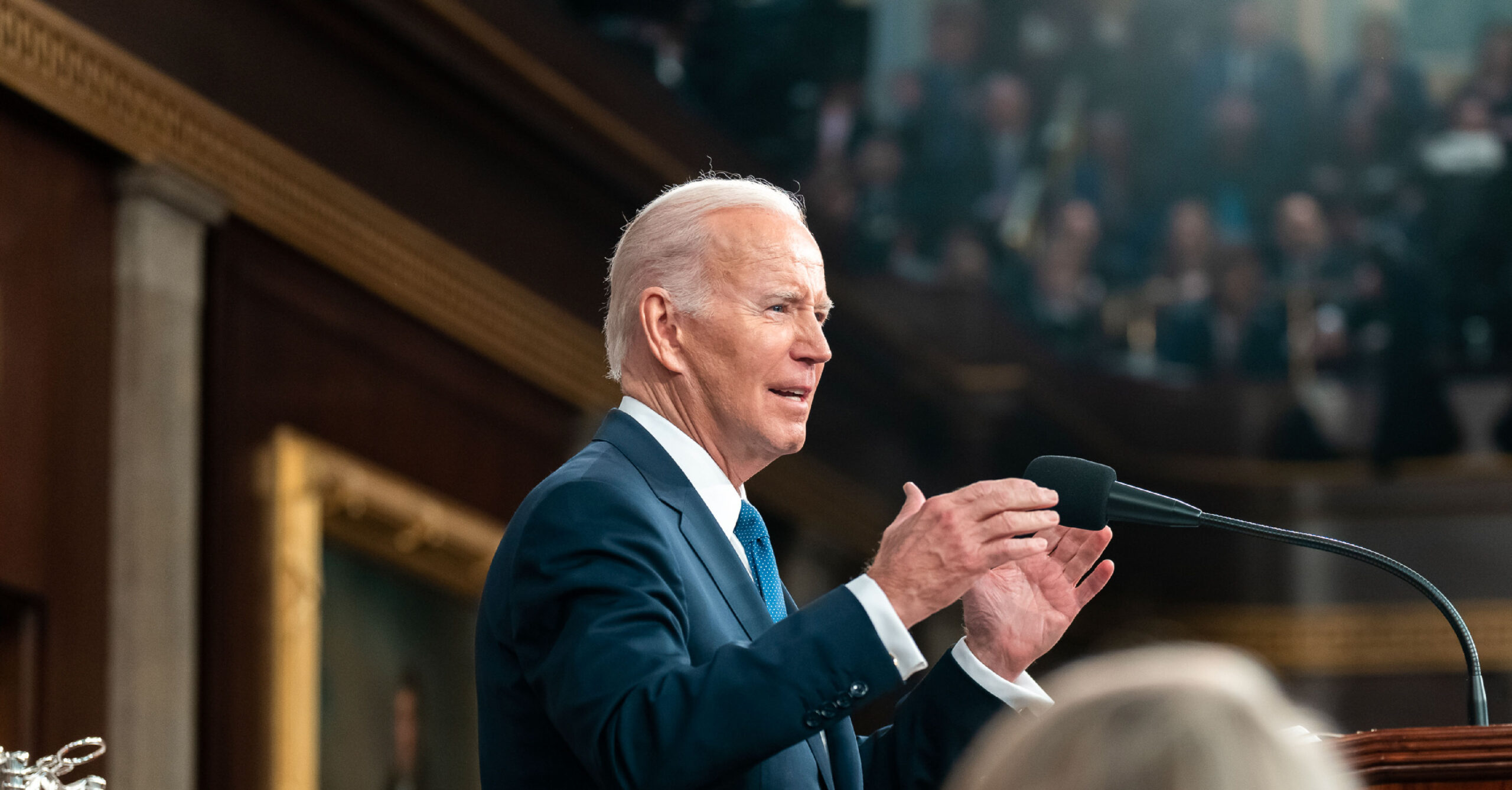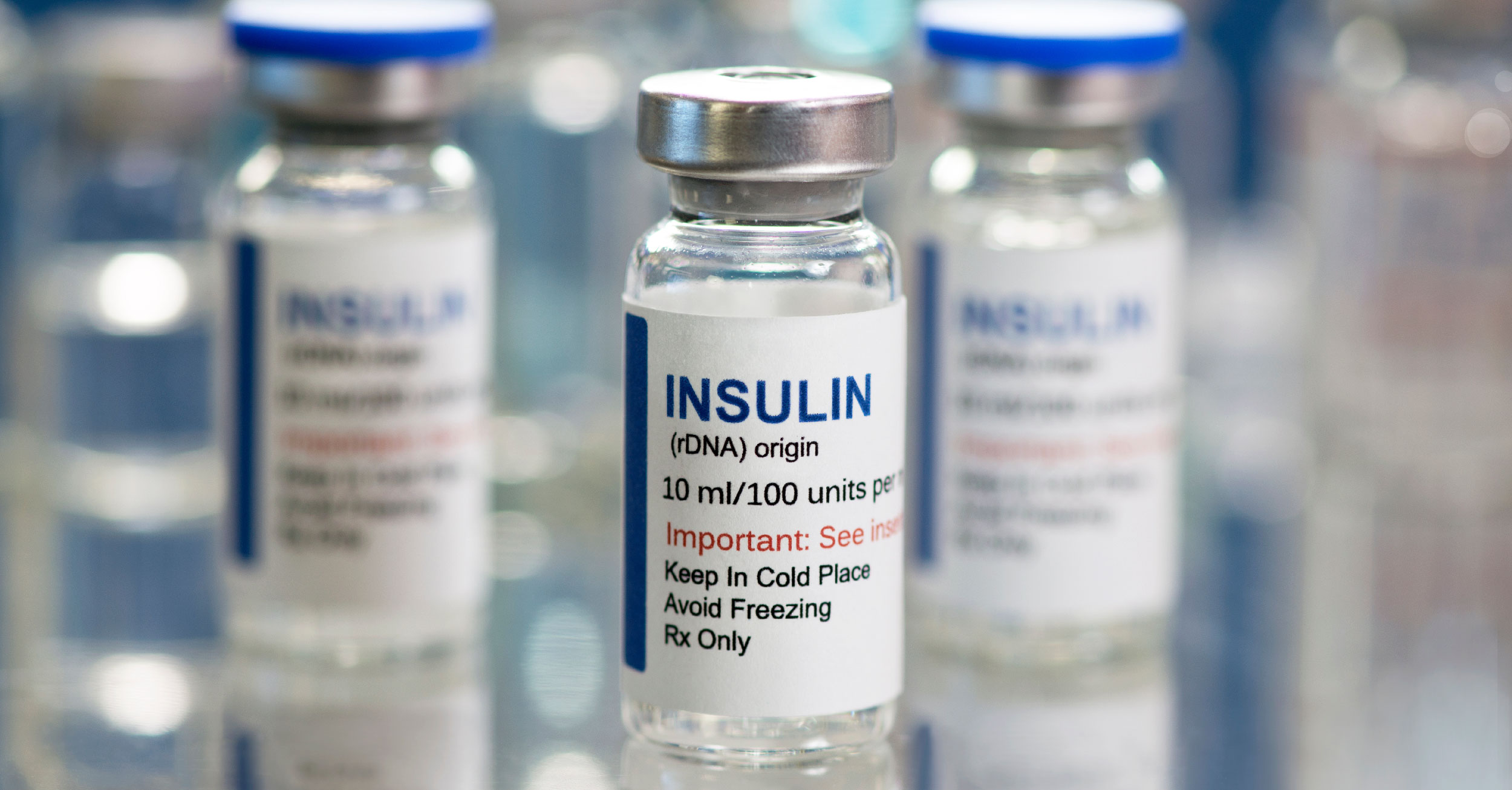

Watch Protect Our Care’s New Video Here.
Vice President Kamala Harris has proven to be a health care champion throughout her career in public service. She has fought tirelessly to improve the health and well-being of people across the country. Harris voted time and time again to protect Americans’ health care, to ensure those with pre-existing conditions have access to affordable health care, and to lower costs for American families. Protect Our Care Chair Leslie Dach issued the following statement:
“Thanks to Kamala Harris, millions of people no longer have to decide between their health care or prescription drugs and putting food on the table. She is a champion for lowering health care costs, expanding access to affordable coverage, improving maternal health, and protecting reproductive rights. Her health care agenda is a win for middle-class families and a win for our nation’s future — a stark contrast to MAGA Republicans who want to go backwards and try once again to repeal the ACA, rip away protections for pre-existing conditions, and raise prescription drug costs for seniors.”
Kamala Harris’s 100-day agenda prioritizes delivering lower prices for middle class families. As Democratic nominee, Harris has announced some of her plans for the first 100 days in office, including actions to further lower drug costs and provide relief for medical debt. Harris has called for:
- Capping The Cost Of Insulin At $35 Per Month For Everyone, Not Just Seniors. The Inflation Reduction Act capped insulin costs at $35 per month for seniors, and now Harris wants to pass these savings on to everyone.
- Accelerating The Speed Of Medicare Drug Price Negotiation. Building on the accomplishments of the Inflation Reduction Act, Harris would allow Medicare to negotiate the price of drugs faster, so prices can come down faster for seniors.
- Increase Competition And Demand Transparency. Harris plans to hold accountable pharmaceutical companies that block competition and promote abusive practices that hurt small pharmacies and raise prices on Americans.
- Cancel Medical Debt For Millions Of Americans. Harris’s plan builds on her accomplishments as vice president in removing medical debt from nearly all Americans’ credit reports and securing American Rescue Plan funds to cancel $7 billion of medical debt for up to 3 million Americans by the end of 2026.
As Vice President, Harris casted the deciding vote to pass the Inflation Reduction Act. She is responsible for lowering prescription drug prices, making tax credits available to lower premium costs for families, and capping insulin copays at $35 per month.
- Gave Medicare The Power To Negotiate Prescription Drug Prices. Medicare drug price negotiation will save taxpayers billions of dollars and lower costs for the most popular and expensive prescription drugs. By 2030, 80 of the most expensive prescription drugs will have lower prices because of these negotiations. In the first year alone, these newly lowered prices will save seniors $1.5 billion in out-of-pocket costs and will save taxpayers $6 billion.
- Lowered Costs Of Health Care Premiums For Millions Of Families. The Inflation Reduction Act lowered premium costs for millions of Americans through 2025 by increasing financial assistance for people who buy coverage on their own and making tax credit subsidies more widely available to middle-class families, ensuring people purchasing coverage through the ACA marketplaces will not pay more than 8.5 percent of their income for coverage. Families save an average of $2,400 a year on their health insurance premiums thanks to this provision.
- Capped Insulin Copays At $35 Per Month. The Inflation Reduction Act capped insulin prices at no more than $35 starting January 2023 — saving seniors up to $1,500 annually. In response to calls from President Biden, the three largest insulin manufacturers announced $35 monthly out-of-pocket cost caps, lowering costs of about 90% of the insulin on the market.
As a senator from California, Harris has repeatedly helped defeat Republican efforts to repeal the Affordable Care Act and remove protections for people with pre-existing conditions. She also supported lowering prescription drug prices, which became a reality with Harris casting the deciding vote as vice president and passing the Inflation Reduction Act.
- Harris Helped Protect The ACA. In 2017, then Senator Harris voted against the Obamacare Repeal and Replace Act, the Better Care Reconciliation Act, and the “Skinny Repeal.” All of these bills would have stripped health care from millions of people and increased premium costs.
- Harris Took A Stand For People With Pre-Existing Conditions. Harris authored an op-ed with CNN in 2017 that illustrated how getting rid of protections for pre-existing conditions would have devastating effects on communities of color. People of color are more than twice as likely to die from diabetes as their white counterparts and Black people experience higher rates of heart disease than white people. Getting rid of pre-existing condition protections, as proposed by Republicans, would disproportionately impact communities of color’s access to affordable health care.
- Harris Blocked The MAGA Plan To Expand Junk Plans That Don’t Cover Pre-Existing Conditions. Harris cosponsored two resolutions to overturn Trump administration health care policies that allow the expansion of short term health care plans that do not have to guarantee coverage for pre-existing conditions or cover essential health benefits.
As a senator from California, Harris protected women’s rights. Maternal and reproductive health freedoms were a key pillar of her work in Congress. Harris continued to fight for women as vice president and pledges to as the Democratic nominee.
- Harris Fought For Maternal Health Protections. Harris was involved with creation and proposing of the first Black Maternal Health Momnibus Act to address this crisis in maternal health. The “Momnibus” would direct HHS to establish task forces to address social determinants of health and award grants to innovations in maternity care and maternal mortality tracking. It also would expand federal nutrition programs through increasing the postpartum and breastfeeding periods and reduce specific state funding to jurisdictions which have no laws restricting constraints on incarcerated pregnant people. Every year since 2020, the Momnibus Act has been reintroduced in the Senate. It is perhaps the most essential central piece of legislation existing to address maternal mortality rates and health equity.
- Harris Protected Reproductive Freedoms And Abortion Access. Harris co-sponsored 14 pieces of legislation that would expand and protect the reproductive rights of Americans. From supporting the Women’s Health Protection Act to protecting access to birth control to fighting for the expansion and protection of insurance coverage for abortions, Harris has a remarkably consistent record when it comes to ensuring Americans have access to quality and affordable reproductive health care.
As Attorney General of California, Harris protected the ACA and stood up to big drug companies. Since the beginning of her career, Harris played a key role in making the ACA what it is today and ensuring pharmaceutical companies are held responsible for exploitative practices.
- Harris Filed 10 Amicus Briefs Defending The ACA As California Attorney General. As Attorney General of California, Harris defended the constitutionality of the ACA in court by arguing the ACA regulates interstate commerce. In the 2011 press release of one of these filings, Harris stated, “Health care reform saves lives, and that is why I am determined to protect this law.” Harris also argued for the protection of contraception mandates, stating, “The right to healthcare services is justly protected under federal law, and the Supreme Court should uphold the ACA’s common-sense accommodation for religious organizations and protect women’s access to essential health care.”
- Harris Held Pharmaceutical Companies Accountable Through Nearly $7.2 Billion in Fines. Then-Attorney General Harris broke records throughout her term when it came to settlements holding pharmaceutical companies accountable for deceptive and illegal practices. She was involved in the second largest recovery from a pharmaceutical company and the largest consumer protection settlement reached with a pharmaceutical company. Of the billions she was able to recover due to inflated drug prices and illegal marketing practices, $2.2 billion came from Johnson and Johnson, whose drugs Xarelto, Stelara, Imbruvica are currently up for Medicare price negotiation, $71 million came from Amgen, whose drug Enbrel is currently up for Medicare price negotiation, $68.5 million came from AstraZeneca, whose drug Farxiga is currently up for Medicare price negotiation, and $19.5 million came from Bristol-Myers Squibb, whose drug Eliquis is currently up for Medicare price negotiation.

